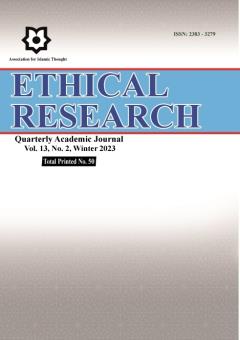-
-
List of Articles
-
Open Access Article
1 - Presenting a model for managing organizational trust in order to improve productivity and social accountability (Study case: Foundation of the Weakened of the Islamic Revolution)
Mohammad Reza Haji anzehaei Mehdi Irannejad Parizi Reza Najafbagy -
Open Access Article
2 - Explaining the moral and legal realm of financial rights and property of couples after divorce in Iranian and French law
Abolhasan Pahlevani Saleh Yamerli ali ajbar esmaeile -
Open Access Article
3 - Investigating the causes and motives of satire in Khaghani and Anvari poetry
hajar jowkar Maryam parhizgari Seyed Jafar Hamidi -
Open Access Article
4 - Bad promise combined with man's ingratitude towards God in the Holy Quran
ozra eshraghjahromi alireza mokhtari Safdar Shaker -
Open Access Article
5 - Examining the moral and intellectual characteristics of the perfect man in the works of certain Attar
Shahrokh Hekmat -
Open Access Article
6 - Role of custom and ethics in the financial rights of couples and its effect on crime prevention
Leila Radpasand Farhad Parvin -
Open Access Article
7 - Analytical and comparative research on types of freedom from the perspective of Islam and the West
mohammad sharifani Mohammad marefat -
Open Access Article
8 - Character, performance and influence of Saad ebn ebadeh Khazareji worship on Saqifa stream
Ramin Alizadeh Mahdi Goljan mahdi ansari -
Open Access Article
9 - Humanism in Nasim Marashi's "autumn novel is the last season of the year"
Javan Mohammad Ali َAbdollah toloeiazar -
Open Access Article
10 - Ethics and Art in Postmodernism from Lyotard’s point of view
Mahdi Mohammadi KiakalaAmlashi Mohammad reza Sharifzadeh hossein ardalani Mohammad Aref -
Open Access Article
11 - Transcendental Person according to Mawlana and perfection psychologists (with emphasis on the first volume of Masnavi)
Jalil Masoudi Fard -
Open Access Article
12 - Examining the legal foundations of eliminating discrimination and violence against women with a view to the commitments of the Afghan government
mojgan moshfeghi peyman bolori salman valizadeh -
Open Access Article
13 - Different aspects of anti-habituation and its various manifestations in Ibn Arabi's mystical poems
shahla norozierad Naser Hosseini ardashir sadraldini -
Open Access Article
14 - Functions of practical reason and explaining the principles of moral practice from the perspective of Allameh Tabatabai
Nasibeh Nikpoor Narges Keshti Arai Seyed Hossein vaezi -
Open Access Article
15 - Criminal motive, interaction between ethics and criminal law
Mojtaba Malek Afzali Ardakani mohamadali mahdavi sabet Firouz Mahmudi Janki -
Open Access Article
16 - What are the characteristics of abortion and its types
Zahra Sadeghi Zohreh Nik Farjam Fariba Pahlevani Abbas Samavati
-
The rights to this website are owned by the Raimag Press Management System.
Copyright © 2017-2026







